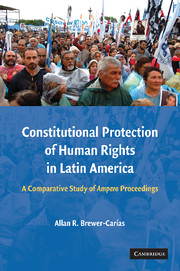 Constitutional Protection of Human Rights in Latin America
Constitutional Protection of Human Rights in Latin America Book contents
- Frontmatter
- Contents
- INTRODUCTION
- PART ONE THE CONSTITUTIONAL AND INTERNATIONAL DECLARATION OF HUMAN RIGHTS AND ITS JUDICIAL GUARANTIES
- PART TWO THE AMPARO AS A LATIN AMERICAN CONSTITUTIONAL AND INTERNATIONAL LAW INSTITUTION
- PART THREE THE INJURED PARTY AND THE CONSTITUTIONAL RIGHTS PROTECTED BY MEANS OF THE AMPARO PROCEEDING
- PART FOUR THE INJURY, THE INJURING PARTY AND THE INJURING ACTS OR OMISSIONS IN THE AMPARO PROCEEDING
- PART FIVE THE EXTRAORDINARY CHARACTER OF THE AMPARO PROCEEDING
- Chapter Seventeen The Question of the Admissibility of the Amparo Action and Its Relation with the Ordinary Judicial Means
- Chapter Eighteen The Main Principles of the Procedure in the Amparo Proceeding
- Chapter Nineteen The Configuration of the Main Phases of the Amparo Proceeding
- Chapter Twenty The Adjudication in the Amparo Proceeding and the Preliminary Protective Measures
- Chapter Twenty-One The Definitive Judicial Adjudication in the Amparo Suit
- Chapter Twenty-Two The Revision of the Amparo Decisions by the Constitutional Court or the Supreme Court
- CONCLUSION
- APPENDIX A List of Latin American Constitutions
- APPENDIX B List of Latin American Amparo Laws (Statutes)
- INDEX
Chapter Twenty - The Adjudication in the Amparo Proceeding and the Preliminary Protective Measures
Published online by Cambridge University Press: 08 August 2009
- Frontmatter
- Contents
- INTRODUCTION
- PART ONE THE CONSTITUTIONAL AND INTERNATIONAL DECLARATION OF HUMAN RIGHTS AND ITS JUDICIAL GUARANTIES
- PART TWO THE AMPARO AS A LATIN AMERICAN CONSTITUTIONAL AND INTERNATIONAL LAW INSTITUTION
- PART THREE THE INJURED PARTY AND THE CONSTITUTIONAL RIGHTS PROTECTED BY MEANS OF THE AMPARO PROCEEDING
- PART FOUR THE INJURY, THE INJURING PARTY AND THE INJURING ACTS OR OMISSIONS IN THE AMPARO PROCEEDING
- PART FIVE THE EXTRAORDINARY CHARACTER OF THE AMPARO PROCEEDING
- Chapter Seventeen The Question of the Admissibility of the Amparo Action and Its Relation with the Ordinary Judicial Means
- Chapter Eighteen The Main Principles of the Procedure in the Amparo Proceeding
- Chapter Nineteen The Configuration of the Main Phases of the Amparo Proceeding
- Chapter Twenty The Adjudication in the Amparo Proceeding and the Preliminary Protective Measures
- Chapter Twenty-One The Definitive Judicial Adjudication in the Amparo Suit
- Chapter Twenty-Two The Revision of the Amparo Decisions by the Constitutional Court or the Supreme Court
- CONCLUSION
- APPENDIX A List of Latin American Constitutions
- APPENDIX B List of Latin American Amparo Laws (Statutes)
- INDEX
Summary
The purpose of the amparo proceeding eventually is for the plaintiff to obtain a judicial adjudication from the competent court, providing for the immediate protection of his harmed or threatened constitutional rights, for instance, through a judicial decision restraining some actions, preserving the status quo, or commanding or prohibiting actions.
Amparo and injunctions are both extraordinary remedies having the same purpose, the main difference between them being the rights to be protected. In the United States, injunctions are equity remedies that can be used for the protection of any kind of personal or property rights, but in Latin America, the amparo proceeding is conceived only for the protection of constitutional rights, which explains its regulations in the constitutions, and not for the protection of rights established in statutes.
In this matter of the amparo proceeding, as well as in matters of injunctions, two general sorts of judicial adjudications can be issued by the courts for the protection of constitutional rights: preliminary measures that can be ordered from the beginning of the procedure, with effects subject to the final court ruling; and definitive decisions preventing the violation or restoring the enjoyment of the threatened or harmed rights.
THE PRELIMINARY AMPARO MEASURES
In Latin America, according to the regulations established in the Civil Procedure Codes, all courts are empowered to adopt, during the course of a procedure, what are called “medidas preventivas” or “medidas cautelares,” that is, interlocutory and temporal judicial measures that are also applied to the amparo proceeding.
- Type
- Chapter
- Information
- Constitutional Protection of Human Rights in Latin AmericaA Comparative Study of Amparo Proceedings, pp. 364 - 376Publisher: Cambridge University PressPrint publication year: 2008


